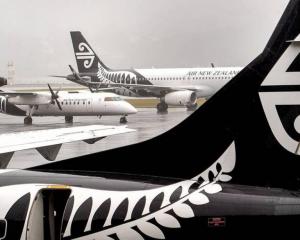Air New Zealand management appears confident the business is well-positioned to manage the changing environment, although the company remains cautious about rising fuel prices.
Craigs Investment Partners broker Chris Timms said a big focus for Air NZ in the past couple of years had been building resilience in the business via structural advantages such as routes, fleet and alliances.
At a recent investor day, Air NZ left its 2018 financial year guidance unchanged, which did not come as a surprise given the main variant of fuel was largely hedged through the second-half.
``Going into 2019, while we agree the company is more resilient than peers and should demonstrate less earnings volatility, this does not mean it is immune,'' Mr Timms said.
The target share price had been lowered to $2.85 from $2.88.
Craigs continued to expect lower earnings to drive the share price but there was little threat seen to the ordinary dividend of 22c per share, he said.
Morningstar analyst Daniel Ragonese said the Australian research firm had a $2.60 per share valuation on Air NZ.
The stock was at present overvalued relative to Morningstar's fair value estimate.
Air NZ shares last traded at $3.25, down 1.66%.
Morningstar had lifted its capacity growth forecasts to 5% on average during the next three years, up from the previous growth forecast estimate of 4% a year. The capacity growth forecast was lower than the airline's plans of between 5% and 7% a year in additional capacity between 2019 and 2021.
``We expect the majority of the capacity growth to be injected into the resilient Tasman-Pacific routes. These routes are leveraged to inbound and domestic tourism - both of which have a positive outlook.''
Financial earnings before tax were likely to exceed last year, despite the company facing more than $100 million in higher fuel expenses, Mr Ragonese said.
The 2018 fuel bill was expected to be about $990 million, marginally higher than the previous estimate of $875 million.
The company should mitigate most of the cost pressure through pricing, productivity, and continuously improving capacity management.
Morningstar was projecting low to mid-single digit earnings per share growth during the next five years.
Competition was already starting to rationalise, particularly in the international routes, Mr Ragonese said.
``The company already controls about 80% of the domestic market and does not expect any major change from these levels. Despite being one of the most known brands in New Zealand, we continue to believe the company lacks a sustainable competitive advantage.''
Air travel was commoditised and customers had limited switching costs. In most cases, a prominent brand did not always translate to pricing power over other brands, Mr Ragonese said.
In the 10 months to April, Air NZ's demand grew by almost 5%, slightly ahead of capacity which grew 4%. The domestic and Tasman-Pacific routes had been key drivers as demand grew by 8% and 7% respectively.












